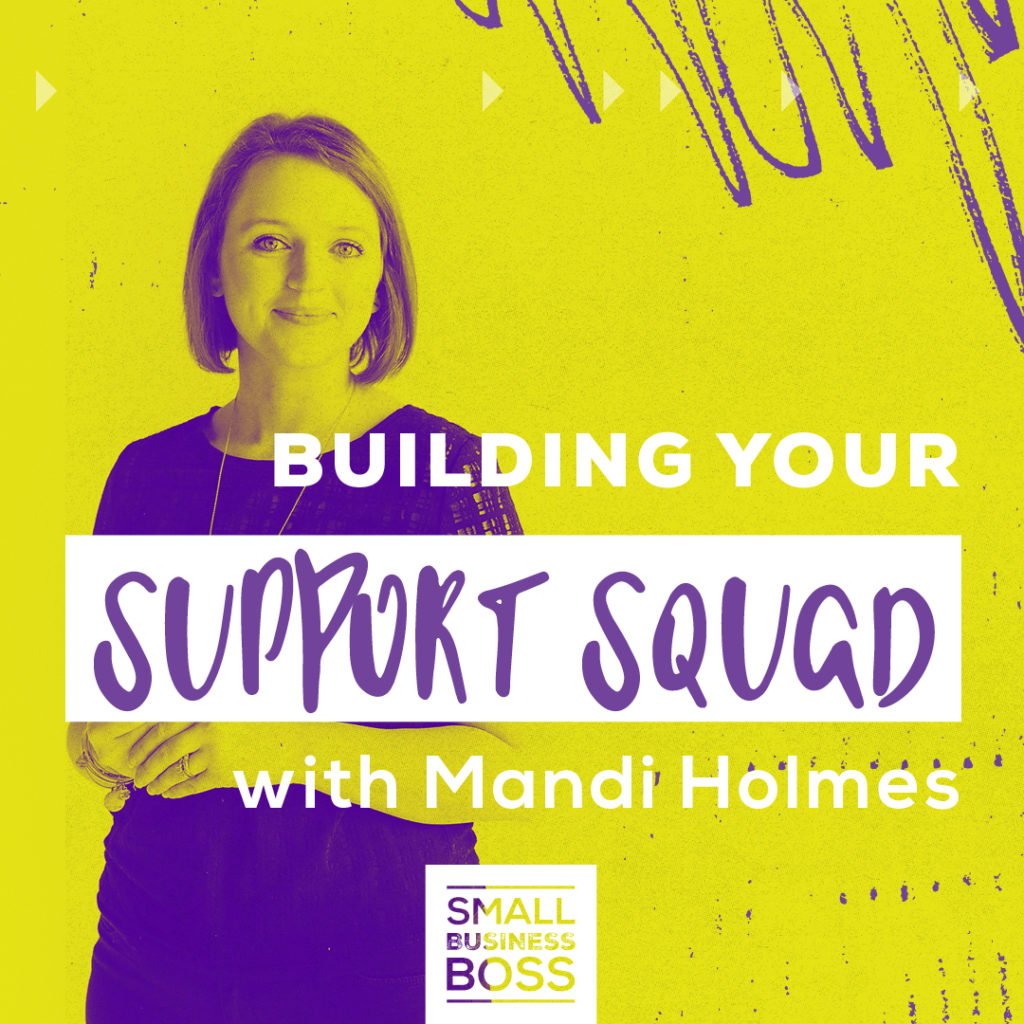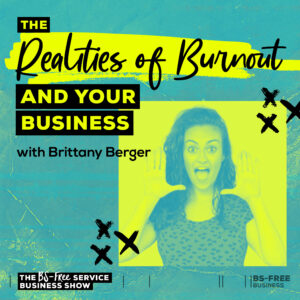
Search the site:
Episode 123: Mandi Holmes on Building Your Support Squad
Hiring is one of the most challenging things for most service business owners, and it’s a question I get constantly. That’s why I’m thrilled to have Mandi Holmes from She Can Coterie join us in this episode to talk about the behind-the-scenes of her business and how to build your support squad.
As a service business owner, knowing when to hire and who to hire can be tricky. Do you hire a VA? A billable subcontractor? There’s no right or wrong answer, but today’s guest Mandi Holmes has helped over 100 business owners get started with outsourcing and runs a thriving business that I can’t wait to share with you. This woman is a total rock star!
Here’s what you need to know about Mandi:
Mandi Holmes is CEO of She Can Coterie, a boutique business and marketing management agency for online, service-based, female business owners.
She Can Coterie started in 2015 when Mandi was unexpectedly laid off from a job as a virtual assistant herself and is now a fully-functioning, expert team that does it all! Blogging and editorial work, social media management, customer service, technical support, inbox support, systems creation, travel and invoicing… you name it, She Can Coterie can do it!
Mandi believes that women should run the world, that asking for help is vital to success, and that having an iced latte in your hand makes you unstoppable. When she’s not leading her team, uplevelling She Can Coterie, or serving powerful women around the world you can find her with her nose in a good book, playing choo choo’s with her sweet son Henry, or binge-watching Netflix with her husband.
How do you make money?
- I was abruptly laid off, and I needed to make money, so I started Mandi Holmes VA.
- I started off as a general VA, and I had a couple of clients right off the bat from the company I got laid off from.
- They trusted me and liked the work that I did, so they started referring me to their friends and colleagues.
- I was doing a lot of general admin, posting on social, expense reports, that sort of admin.
- I started getting more and more clients. I didn’t really have boundaries around what I would do. I needed to make money — I didn’t have a job!
- I did anything anyone asked me to, but after about two months, I got completely overwhelmed with work. Mostly because of the boundaries.
- I called my sister, who had just had a baby, and she decided she was going to stay home, so I brought her on to help with the travel, the bookkeeping, expense reports side. She did that for the clients, and I did everything else.
- After that, I was really sick of the social media side, and I brought on someone to help with that.
- Right around that time, I found out I was pregnant, so I knew I had to make this into something sustainable. I brought on someone else to take over my role while I was out on maternity leave.
- When I came back, I let our clients know that we have a team and that they get to work with a team now.
- So, now, we do almost anything, but instead of it all falling on me, every team member has a specialty and an expertise, so anything from the general admin to legitimate bookkeeping to design to content management and marketing to social media marketing.
- We do all the things that a service-based business owner needs.
You offer a lot of services, so you probably have a unique perspective on some of the bigger challenges that come with offering services.
- One of the first challenges were trading dollars for hours. I was trying to figure out how to scale beyond that just trading my team’s hours and the hours my clients were paying for.
- So we started creating some packages so that we could have different kinds of offerings that had different levels of income for less work and it wasn’t that trade.
- I wanted to build the business deep and tall instead of just spreading us out wide by just bringing on new people when we reached the team’s capacity.
Do you do anything with your packages personally, Mandi?
- No! Each of the offerings has a manager in charge, so they take the discovery calls…they’re the experts. It wouldn’t be fair for me to take the call because I wouldn’t know what to tell them about a deep kind of strategy in a certain area. But they do take the discovery calls, they do the onboarding, they do the work.
- Above those managers, we have another manager who manages all of those offerings, so she does team meetings with them, she then she tells me what’s going on.
- I don’t touch anything over there. They’re the experts, so if they want to propose something new, if they want to change up the sales page, if they want to reach out to a prospect, they do it all on their own.
- It’s really beautiful, and it makes me feel like a boss!
How did you develop your packages? Was it that you were doing the same things over and over again, or did you see an opening in the market for it?
- It was a little bit of both.
- The first package we created was a Pinterest package. It’s something that took a really customized strategy, and it wasn’t just task-work.
- I saw that there were so many courses teaching people to use Pinterest, so I reached out to some people and did a little bit of research and realized it’s a huge traffic driver to your site.
- I felt like it was a need, and I felt it was something our clients could really use. It was something that would go beyond hourly work. It needed to be its own strategy, it needed to have its own manager to do the work.
- So, I hired someone who would help me develop the package because I didn’t really know much about Pinterest, and I knew I didn’t want to be the one doing the work, so I hired someone to develop the package that really knew Pinterest.
- As that package grew, we hired someone under her to help do some of the more technical work.
- That’s really how each of the packages has been created. I did see a need, and then I hired someone to help me develop the package.
- Now, we’re asking the women on the hourly-based team what can we offer as a package. What do you see a need for?
- So, we’re working on a tech package where it’s almost like a tech retainer or she can help you with very specific things, like Infusionsoft, which you don’t want to handle.
You mentioned that early on, a lot of your business came by referrals. How do your clients typically find you now? Where are most of your clients coming from?
- I think we’re still about 75% referral.
- As your business grows, and as you have more clients, there is more opportunity for them to refer you, so we still get a ton of word-of-mouth.
- As we’ve been really active on Instagram and even Pinterest, those are two other places that people say they find us.
You have a pretty big team. How big is your team, and how have you found the right people that fit with your vision? I think finding the bodies is not the challenge; it’s really having the people who are going to invest in your company and what you want to be doing providing the kind quality of service that you want to be known for.
- I started off finding people in Facebook groups. It sounds weird, but that’s where people are.
- A lot of people that want to do this kind of work that don’t want to have their own business, that really have a passion for the doing, but they don’t want to do what we do, where are having to set everything up and pay for all the systems and find all the clients.
- Now, we put out a call on social media, and that’s how we find people.
- Our application process is a little bit different. We have a form they fill out that really gets to know them personally, then asks them their level of proficiency for the kind of task work they’re going to be doing.
- Then we ask them fun questions because we like to be a fun place to work. We ask them what’s your favorite coffee shop order so we see where we jive with them.
- Once they fill out that form, they have to create a Pinterest board that introduces us to who they are. That gives us another feel for their personality, their values, that sort of thing.
- Then they film a video introducing themselves to the team, and send that over.
- It takes an attention to detail to be able to do all three steps. If we have 25 people who apply through the form, we probably only get 7-8 completed applications with the Pinterest board and video. It really narrows the field.
- We can really get to know who they are, what their values are, what they believe, and their level of expertise and professionalism.
- In the interview and onboarding process, we walk them through our values, the way that we work, how we talk to clients, how we work as a team.
- We are really careful about strategically onboarding them so they really get the full welcome into the team, so they know what’s expected and how we do business.
What is your best piece of advice for people who are ready to start hiring, for people who are ready to get some things off their plate, or handing off some client work to someone?
- Get your systems and processes in order.
- Before you bring someone on, you need to know exactly what they’re going to be doing or else you’re going to waste everyone’s time and money.
- Figure out what it is that you’re going to hire them for and what tasks they’re going to be doing.
- The best way to do this is to walk-thru everything they’ll be doing, and make a list, step-by-step, what the task includes, and you can even film a video which is super helpful for them to go back to over and over again, and it helps with consistency, so they’re doing the tasks the same way every time.
- Then, put it in some task management system. For our team, we use Asana, but you can use Trello, Basecamp, Teamwork, anything like that to really get your systems and processes down, so that it’s a place where they can reference it, and everyone understands what’s involved.
- There’s room for updating it and improving it because whenever you hire someone, you really want someone who’s going to take it to the next level.
- Getting it written down in order of how you want it to be done is going to help create consistency and make sure it gets done on time in the right way.
Lessons from this interview:
- Before you hire, get clear on what you really need help with. Figure out where you need systems, and have a plan so everyone can succeed.
- I love how Mandi has added packages to her business, letting her team be the experts, sell the service and deliver on it. That’s how you scale a service business.
- Mandi talked about her process for finding and vetting her team. I love how they bring the fun as they want to be a fun place to work. The skills are one thing, but cultural fit is important for them to create a great place to work.
Links for this show:

I’m Maggie Patterson (she/her), and services businesses are my business.
I have 20+ years of experience with client services, am a consultant for agency owners, creatives, and consultants, and vocal advocate for humane business practices rooted in empathy, respect, and trust.
Read or Listen to the Latest
For Solo Business Owners

Growing a solo service business is tough.
It’s even harder when you’re bombarded with BS advice that steers you away from your values and why you started your business in the first place.
This is the podcast for solo creatives and consultants who want to remain as a team of one and have zero interest in the hustle and grind of typical business teachings.
Subscribe now and never miss an episode.
For Micro Agency Owners
Most podcasts for agency owners obsess over revenue growth as the ultimate success metric.

But here’s the truth: not everyone wants to make millions. Your goal might be to build a sustainable business that lets you have a life and doesn’t run you into the ground.
Join me as I spill my shameless confessions and share everything I’ve learned about building a micro agency that skips the BS of tired and typical agency teachings.
Follow Now on All Major Podcast Platforms








